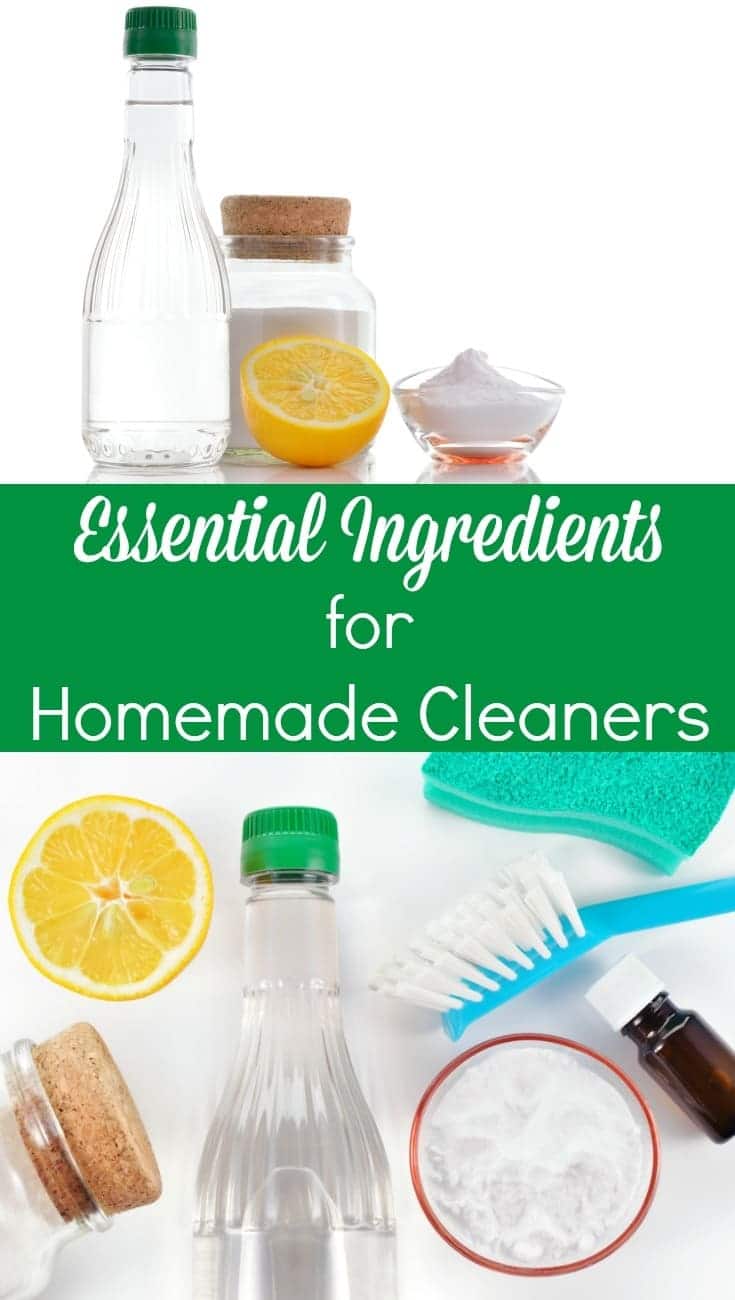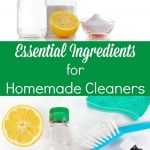Did you know that you can make dozens of homemade cleaners with just a few simple ingredients? You can avoid spending tons of money on store-bought cleaners that are full of harmful chemicals by making your own DIY cleaning products instead.

For a long time, I thought household cleaners only posed a danger to my family because if ingested, they could poison my children. I had no idea that the repeated exposure to chemical residues left behind on the surfaces throughout my home could be doing more harm to my children than the germs I was trying to wash away.
Many household cleaners contain carcinogens, endocrine disruptors, and neurotoxins! Children are constantly touching things and putting things in their mouths. And since their little bodies are so much smaller than ours, the concentration of those dangerous ingredients is much higher in children (and our pets).
Fortunately, there are a lot of natural ingredients that clean just as well without the harmful side effects.
Essential Ingredients for Homemade Cleaners
Baking Soda
Baking soda is an ideal scouring agent in your homemade cleaners. It’s also a powerful deodorizer, and it can even be used to clean your retainer.
Note: Do not combine with vinegar or you’ll lose the effectiveness of both.
Coarse Salt
Salt is another effective scouring agent that is 100% safe and natural. It also works well as a softener.
Distilled White Vinegar
Vinegar is a wonderful alternative to harsh chemicals like bleach since it fights bacteria. It’s also highly effective against grease, soap residue and stains.
Note: Do not use on marble or granite. Do not combine with baking soda, castile soap, or hydrogen peroxide.
Hydrogen Peroxide
Hydrogen peroxide is super effective at killing bacteria, thus making it a great substitute for bleach and ammonia.
Note: Do not combine hydrogen peroxide with vinegar.
Vodka
Vodka is terrific for cleaning glass and chrome. And it works well at eliminating mildew too. You can substitute rubbing alcohol (aka isopropyl alcohol) for vodka in homemade cleaner recipes.
Castile Soap
Castile soap is a staple in many DIY natural products. It’s gentle on the skin but tough on dirt and grease.
Note: Do not combine castile soap with vinegar.
Bar Soap
Bar soap is used grated in a lot of homemade laundry detergent recipes and dish soap. Left whole, it can be used to pretreat stains.
Washing Soda
Washing soda is a natural laundry booster. It’s also used in many homemade cleaner recipes for its ability to cut grease, deodorize and disinfect.
Borax
Borax is natural, but not 100% safe. I’m including it on the list because it has unmatched whitening and stain-fighting power.
Note: Borax poses the greatest risk when inhaled, comes in contact with eyes, or is undiluted.
Citric Acid
Citric acid is ideal for preventing water spots and cloudiness when used to wash dishes and leaves glass and mirrors sparkling and streak-free. It’s handy for cleaning stainless steel. And it works like magic on wine stains.
Olive Oil
Olive oil is used in several DIY furniture cleaners since it conditions wood as it cleans away dirt.
Essential Oils
Many people think essential oils are used in homemade cleaning products simply to make them smell good. While it’s true that they provide some aromatherapy to make cleaning more pleasant, another reason essential oils are prevalent in DIY cleaners is because many of them have powerful antibacterial, antifungal, and antiviral qualities!
You don’t have to join an MLM or purchase complete sets to get high quality essential oils at reasonable prices. I buy mine from Rocky Mountain Oils since they carry 100% pure and natural essential oils and stand behind their products with a 100% satisfaction guarantee backed with an amazing 90-day no questions asked product return policy.
The most common essential oils used in homemade cleaners are:
- Lemon (antiviral and antibacterial, good at removing stains)
- Tea Tree (antibacterial, antiseptic, and antifungal)
- Peppermint (antibacterial)
- Rosemary (antibacterial and antiseptic)
Shop For Essential Ingredients for Homemade Cleaners
You can find most of these essentials at your local grocery store. I’ve provided links to my favorite products below that you can purchase online if you want to save a trip to the store or have difficulty finding any of the items locally.
Recipes for Homemade Cleaners
Using the ingredients and information above, you should be able to create your own cleaning combinations. For those of you who prefer to follow recipes though, here are some of my favorite collections from other sites:
- Top 10 Essential Oil Cleaning Recipes (The Prairie Homestead)
- Natural Cleaning Recipes with Essential Oils (Mother Earth Living)
- 8 Natural Cleaning Products You Can Easily Make (Rodale’s Organic Life)
- DIY Natural Cleaning Products (Mama Instincts)
Now you’re armed with everything you need to fight germs without exposing your family to harmful chemicals and toxins. Since many of these homemade cleaner ingredients are items you can find in your kitchen, you’ll no longer have to worry about what your littles ones are accidentally ingesting and absorbing while they play around the house.


